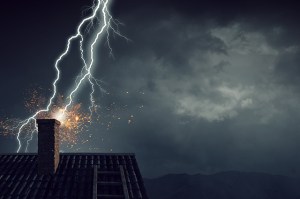You spent months finding the home of your dreams, you put in your offer and it was accepted — but it’s not time to celebrate just yet. Before you close the deal, you need to know exactly what you’re signing up for. No house is perfect, but some defects are more costly than others to fix. Armed with the results from a defect checklist for a new house, you may be able to negotiate a lower price.
A thorough home inspection enables the buyer to have a realistic understanding of the impact of what they are getting themselves into in terms of insurability, too, according to Jodi DeSantis, vice president of insurance sales for AAA Northeast. “It might look like it’s full of character [to you], but that’s not how insurance companies might look at it.”
“Unless you are paying cash for the property, your lien holder will require you to have insurance in place before they release the money to you,” adds DeSantis. Most insurance companies have some sort of inspection requirement from an exterior inspection to an actual walk-through of the home. “The insurance company inspector probably isn’t going to pull out a ladder to climb on your roof or get into the crawlspace,” says DeSantis. “But the inspector that the homeowner hires should actually be doing that.”
A pre-purchased home inspection should be performed by a licensed professional and is meant to inform prospective homeowners about the condition of the house. Don’t make the mistake of assuming the seller is going to repair everything — or anything — the inspector finds. It is also not the inspector’s job to advise you as to whether or not you should purchase the home; they report, you decide. Before choosing an inspector, be sure to do your homework and ask the right questions.
Defects to Look For
To be sure all bases are covered by the professional home inspector’s investigation, your personal defect checklist for a new house should include the following.
Walls and ceilings
Be aware of cracks, holes, chips, wavy and uneven surfaces, missing plaster, fungus, water marks, lumps, bubbles, flaky paint, protruding nails, pipes and loose wiring.
Doors and windows
Check for damage such as missing screws or rust and gaps between door and window frames. Make sure they can be opened and closed easily and look for potential water damage due to improper installation.
Floor and tiles
Are there missing, cracked or chipped tiles? Tiles should not be slanting and there should be no gaps in the wall skirting.
Fixtures
Make sure all sinks and showers have fixtures. Ensure everything works and nothing is missing.
Pipes and plumbing
Check exposed pipes for leaks and be on the lookout for water stains on ceilings, which can signal a leak behind a wall. Low water pressure can also be a symptom of faulty plumbing.
Electricity and wiring
Look for wires without wire nuts and open junction boxes.
Drainage
Soggy areas in the yard and leaks in the basement can signal drainage issues.
Roof and gutters
Look for worn shingles and overgrown trees or landscaping that is encroaching on the roof or overhanging the structure. Basement dampness can be a sign of clogged gutters.
Foundation
Small cracks, sticking doors and windows can suggest foundation flaws.

Potential Deal Breakers
The most common issues identified on a home inspection checklist are usually the easiest and least costly to address, according to the American Society of Home Inspectors; however, they may be an indication of bigger, pricier problems.
The roof needs replacing
Home Advisor data shows the national average for a roof replacement in 2025 ranges from $5,867 to $13,209.
The house is in a flood zone
Use FEMA’s flood maps to determine if the home is at a higher risk for flooding. Remember, flood insurance needs to be purchased separately from your regular homeowners policy.
Contact a AAA Insurance agent today to learn more.
Major foundation issues
Hire a structural engineer to determine if the cracks you spot are serious.
Aluminum wiring
This type of wiring almost always needs to be replaced. The process can cost thousands of dollars.
Once you have your home inspection report — essentially, a custom defect checklist for a new house — you can determine if negotiations with the seller are reasonable.
Some inspectors might estimate the remaining useful life of appliances or other systems for you (this is something to ask before you hire your inspector). You can also get your own repair and replacement bids from local contractors and home improvement stores. The more due diligence you commit to upfront, the happier you will be when you take ownership of your new home with your eyes wide open.
Learn more about AAA homeowners insurance. In the market for a new home? Get a mortgage with help from AAA.
Do you have any advice to add from your home buying experience? Share it in the comments.
2 Thoughts on “Must-Check Defect Checklist for a New House”
Leave A Comment
Comments are subject to moderation and may or may not be published at the editor’s discretion. Only comments that are relevant to the article and add value to the Your AAA community will be considered. Comments may be edited for clarity and length.














Have home inspector show buyers how to shut off entire water supply and electrical panel in case of an emergency.
Make sure there are screens for the windows. Make note of any windows missing proper screens.